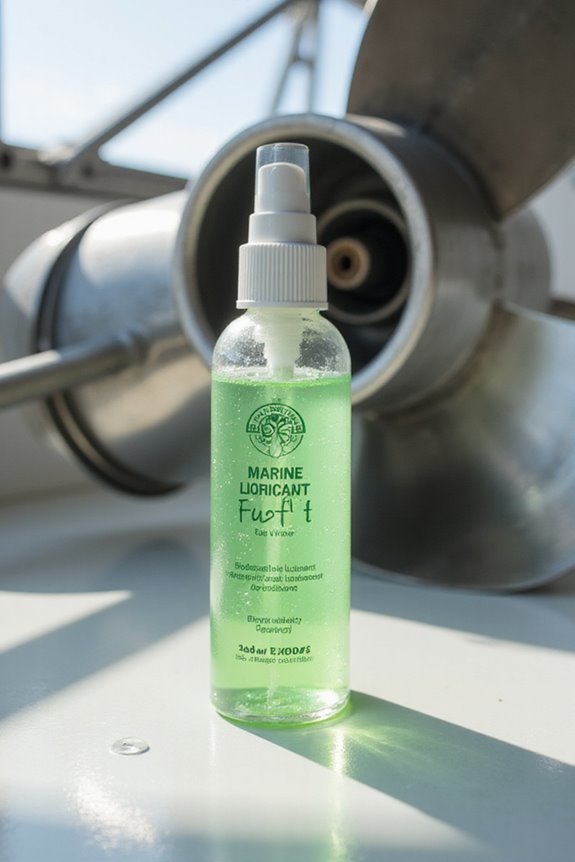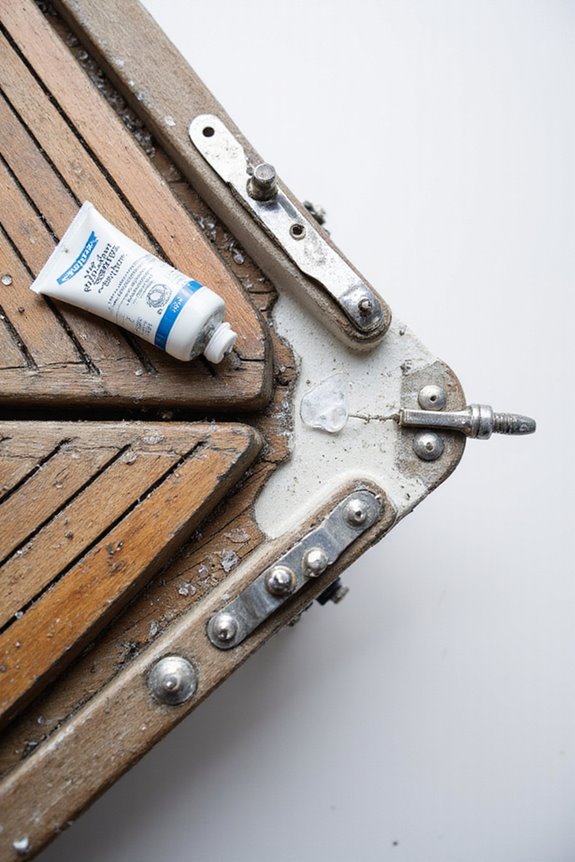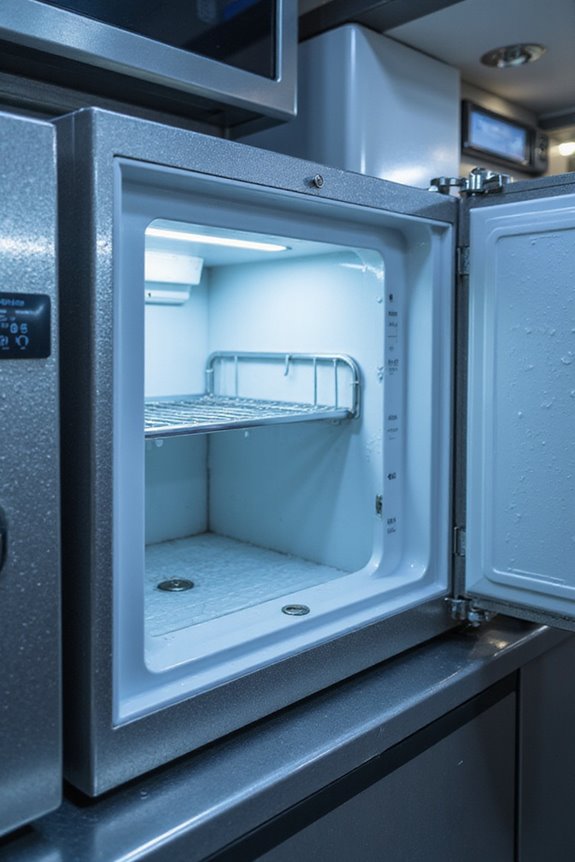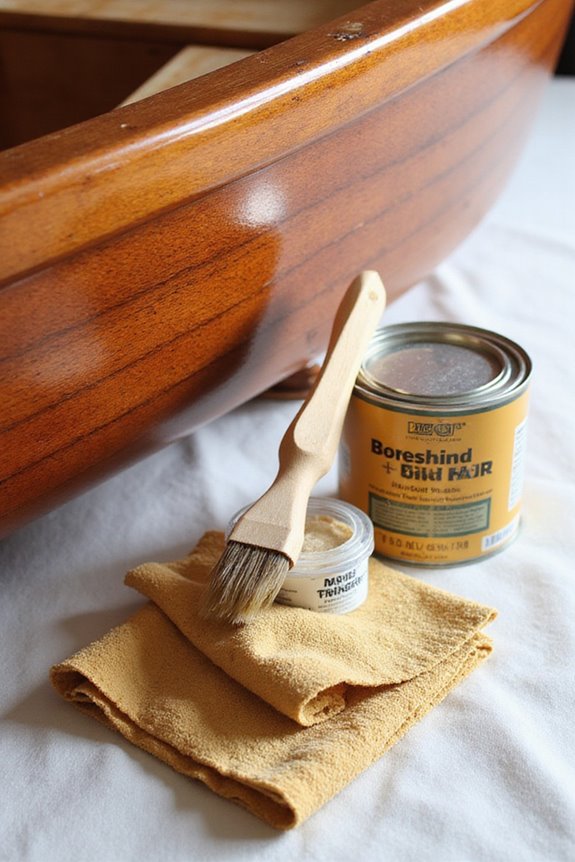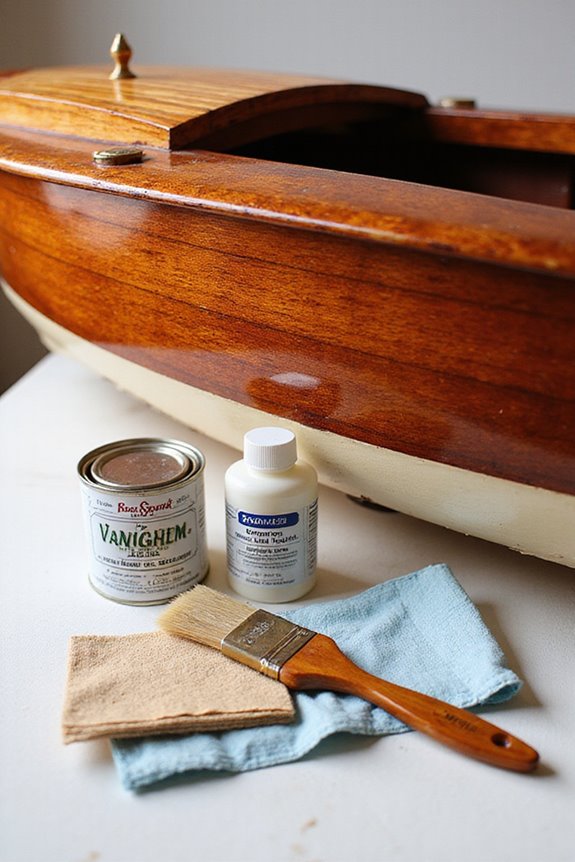We all want to keep our boats running smooth without wrecking the ocean, right? Eco-friendly boat lubricants, known as Environmentally Acceptable Lubricants (EALs), are biodegradable oils made from veggie oils or synthetic esters that break down quickly and protect marine life. They meet strict regulations, cut friction for better engine life, and reduce emissions—a win-win for performance and the planet. Curious about how these green lubes are reshaping marine tech? You’ll find plenty to explore ahead.
Key Takeaways
- Eco-friendly boat lubricants are biodegradable, made from vegetable oils or synthetic esters, reducing harm to marine ecosystems during spills.
- These lubricants enhance engine performance by reducing friction and wear, improving fuel efficiency and equipment longevity.
- Regulatory mandates, like those from the IMO, require use of environmentally acceptable lubricants (EALs) in many marine regions to protect water quality.
- Zinc-free additives and non-toxic formulations maintain lubricant effectiveness while minimizing ecological impact.
- Market trends and innovations focus on sustainable, high-performance lubricants to support cleaner oceans and meet evolving environmental standards.
Defining Environmentally Acceptable Lubricants
While we might not often think about what keeps boats running smoothly without harming the oceans, Environmentally Acceptable Lubricants, or EALs, play a huge role in that. These eco-friendly lubricants meet strict lubricant standards set by groups like the International Maritime Organisation, ensuring they biodegrade rapidly and won’t poison our aquatic friends. What makes EALs special? They’re made with sustainable sourcing in mind—think vegetable oils and synthetic esters rather than traditional petroleum. This means when spills happen (because, let’s face it, accidents occur), the mess breaks down quickly. Plus, many regions, including US waters, require EAL use to protect marine life and avoid hefty fines. So, choosing EALs isn’t just smart—it’s our collective responsibility to keep our waters safe while keeping boats shipshape. Cool, right?
Key Ingredients and Additive Technologies
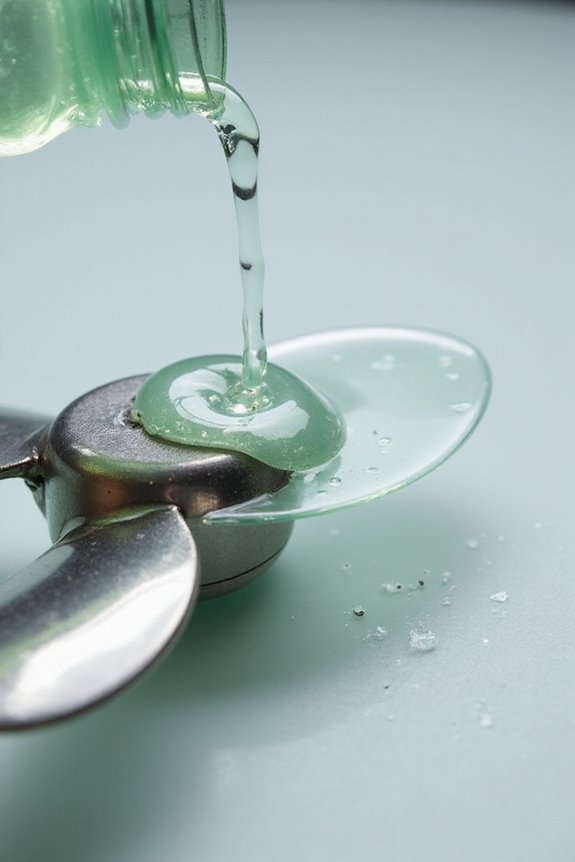
Understanding what’s inside eco-friendly boat lubricants can make us appreciate just how smart these products really are. We’re talking biodegradable oils—usually vegetable-based or synthetic esters—that break down naturally and keep our waters safe. But wait, there’s more! Ever heard of ionic liquids? These clever additives cut friction by half and wear tenfold, all without toxic ingredients. They slip in at tiny doses, forming protective films on gears and bearings, extending our boat’s life while minding the marine ecosystem.
Plus, we ditch zinc-based additives, which you could say are the “bad apples” of traditional lubricants, replacing them with zinc-free alternatives that still keep corrosion and foam in check. So, with smart base oils and cutting-edge additives, our eco-friendly lubricants truly blend performance with planet care. Who said green can’t be tough?
Regulatory Frameworks Governing Marine Lubricants
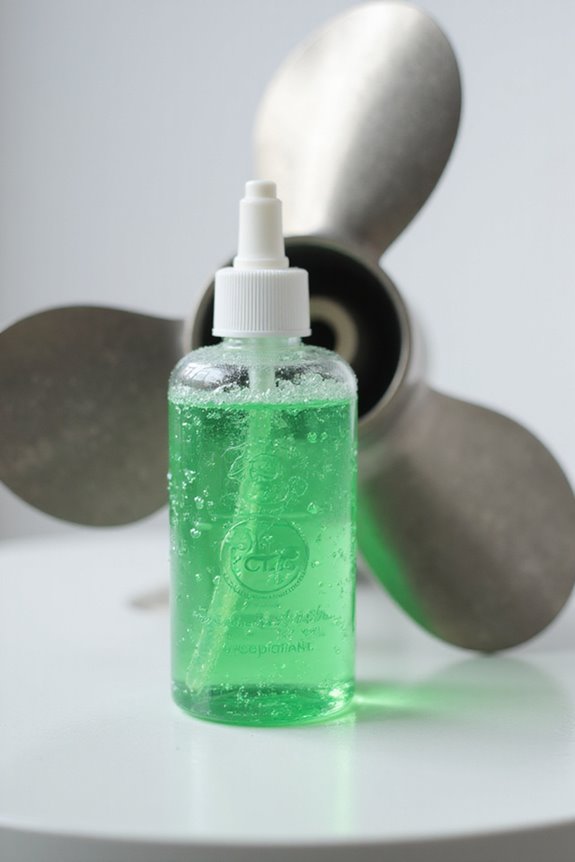
Since boats don’t operate in a vacuum, they’re subject to a bunch of rules that keep our waters and skies cleaner—think of these as the marine lubricant traffic cops. The International Maritime Organization’s 2020 sulfur cap and regional limits, like those in North America and Europe, push us toward eco-friendlier fuels and lubricants. But here’s the catch: maneuvering regulatory challenges isn’t cheap—compliance costs can sting, from fuel testing to fitting scrubbers. We all share a part in following these strict standards, including keeping documentation ready and making sure lubricants meet ISO 8217 specs for new low-sulfur fuels. It’s a team effort, balancing environmental goals with operational realities, ensuring our boats run cleanly without turning into a bureaucratic nightmare. After all, cleaner waters benefit everyone on and off the boat!
Performance Benefits of Biodegradable Lubricants
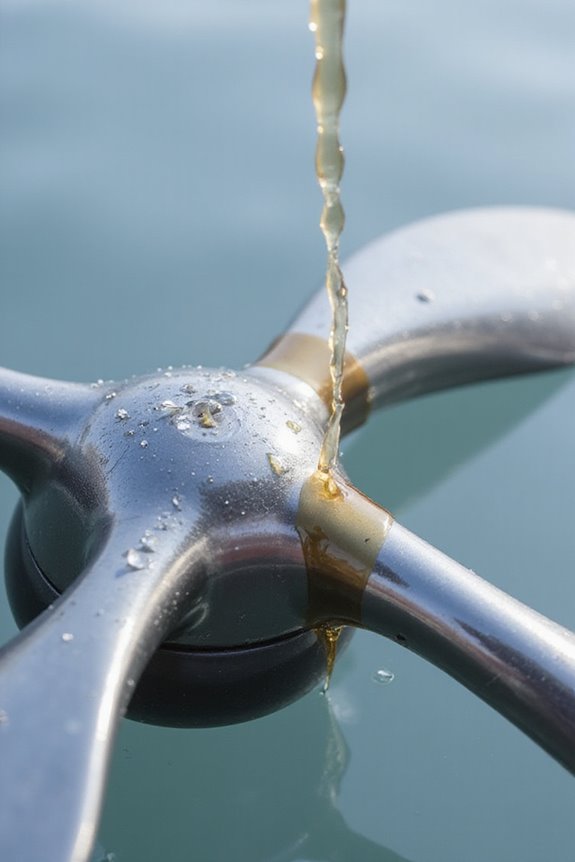
When it comes to keeping our boats running smoothly, biodegradable lubricants aren’t just good for the environment—they actually deliver some serious performance perks. Ever noticed how a well-lubricated engine just seems happier? That’s because these eco-friendly oils excel in key performance metrics like friction reduction and shear stability, which means less wear and tear. Plus, their lubrication longevity is no joke—they resist oxidation and hold steady viscosity across temperature swings, so your equipment stays protected longer. And while they’re busy making your engine purr, they also improve fuel efficiency by reducing power losses. So, why settle for less when you can have lubricants that boost your boat’s lifespan and keep things running cooler? Sounds like a smart swap, right?
Environmental Advantages and Impact Reduction
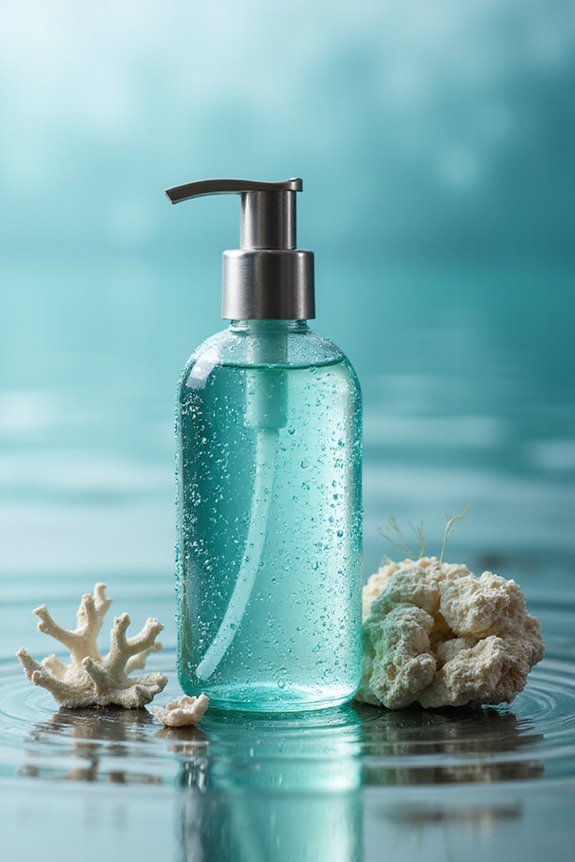
Although we might not think about boat lubricants much, the shift to eco-friendly options brings some impressive environmental benefits worth knowing. These lubricants naturally biodegrade, meaning they break down quickly without lingering pollution—a big win for reducing environmental impact in our waters. Using renewable plant-based oils not only supports marine sustainability but also cuts reliance on fossil fuels. Safer for fish and other sea life, these lubricants avoid toxic additives common in traditional products, so spills cause less harm and cleanup is easier and cheaper. Plus, they meet strict EPA standards and pass tough ecotoxicity tests, helping both us boaters and the environment stay compliant and healthy. Isn’t it satisfying when taking care of our gear also means caring for the ocean?
Innovations and Leading Products in the Market
While steering through the world of boat lubricants might not be everyone’s idea of a thrilling voyage, the recent wave of innovations in eco-friendly marine lubricants is definitely worth our attention. Together, we’re seeing sustainable formulations—like environmentally acceptable lubricants (EALs) and bio-based oils—designed specifically for marine applications. These products not only reduce emissions but boost engine life and fuel economy thanks to enhanced thermal stability. Leaders like ENOC, Aramco, and Shell are pushing these advances, offering greases, gear oils, and hydraulic oils that meet tougher regulations. Plus, with smart tech like IoT sensors, we can optimize lubricant use like never before. So, why settle for old-school oils when smarter, greener options are charting a course right ahead? It’s a step we’re ready to take together.
Compliance Strategies for Vessel Operators
Since the rules around boat lubricants have tightened, keeping our vessels compliant isn’t just about ticking boxes—it’s about protecting the waters we all enjoy. So, how do we stay ahead? First, regular compliance audits are key. They help us spot any old petroleum-based lubricants that don’t meet VIDA or EPA standards. Next comes smart lubricant sourcing—partnering with suppliers who provide verified, eco-friendly products like EPA-approved Environmentally Acceptable Lubricants (EALs) or those carrying the EU Ecolabel. Training our crews on handling these lubricants guarantees their benefits aren’t wasted. Plus, incorporating these steps into our environmental management keeps us sailing smoothly through evolving regulations. After all, we’re not just maintaining boats; we’re maintaining a cleaner, healthier marine environment for everyone.
Advocacy and Industry Perspectives on Sustainability
How can we as an industry truly steer toward sustainability in marine lubricants? It starts with embracing sustainable practices and eco advocacy together. We’re seeing growing momentum—industry groups and NGOs educate us all on greener choices, while consumer awareness campaigns remind boat owners to properly dispose of lubricants. Collaborative networks connect businesses, sharing best practices that help reduce pollution and carbon footprints. Regulations like those from the IMO push us to innovate, encouraging bio-based lubricants and circular approaches. But here’s the fun part: working closely with recycling startups and tech innovators not only helps the planet but strengthens our community. So, by combining smart innovation with responsible action, we create a marine industry that’s cleaner and more connected. Ready to join the wave?
Future Directions in Eco-Friendly Lubricant Development
We all want marine lubricants that work hard without leaving a big footprint, right? Looking ahead, future trends in eco-friendly lubricants show exciting advances—like bio-based formulas growing rapidly thanks to tougher emissions rules and smarter digital monitoring. Sure, market challenges remain, like balancing performance demands with environmental safety, but innovations like customized lubricants and IoT sensors are helping us address these head-on. Plus, regulators pushing greener standards are nudging the market toward safer, biodegradable options—think less toxic chemicals and more fuel-saving magic. So, while maneuvering through these shifts isn’t always smooth sailing, the horizon looks promising. Together, we can support these smart innovations that keep engines purring and oceans cleaner. Why settle when the future’s steering us to better, greener lubricants?
Frequently Asked Questions
How Do Eco-Friendly Lubricants Affect Boat Engine Maintenance Schedules?
We’ve seen eco-friendly lubricants improve engine efficiency and help extend maintenance intervals. Together, we can embrace these benefits, adjusting schedules slightly at first, to enjoy smoother rides and more reliable engine care over time.
Are There Specific Storage Requirements for Biodegradable Marine Lubricants?
Did you know storing biodegradable lubricants above 30°C can reduce their effectiveness by up to 40%? We must use proper container materials and maintain ideal storage temperature, so together we keep our engines and environment safe.
Can Eco-Friendly Lubricants Be Mixed With Conventional Oils Safely?
We shouldn’t mix eco-friendly lubricants with conventional oils without thorough compatibility testing, as it could harm performance and increase environmental impact. Let’s follow guidelines together to protect our equipment and the planet responsibly.
What Is the Cost Difference Between Eco-Friendly and Traditional Boat Lubricants?
Let’s navigate the cost analysis waters together: eco-friendly lubricants can be up to four times pricier than traditional ones in price comparison. But with us, investing now means joining a community steering toward sustainable savings and care.
How Do Weather Conditions Influence the Performance of Biodegradable Lubricants?
It is understood temperature effects can speed oxidation and change viscosity, while humidity impact may accelerate degradation. Together, they challenge lubricant stability, but by choosing formulations wisely, we guarantee durable performance and protect our shared equipment in all conditions.

